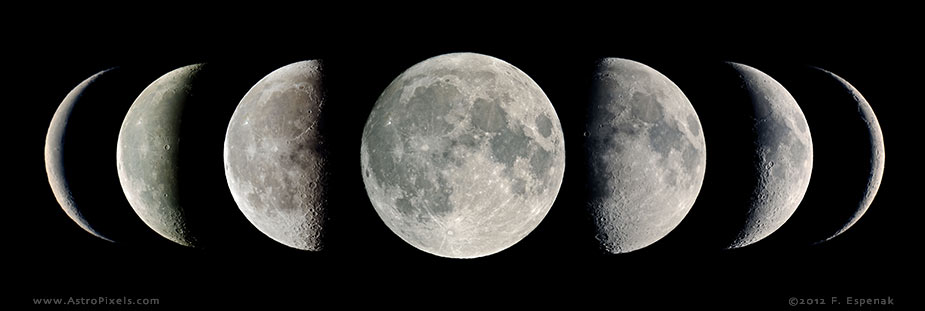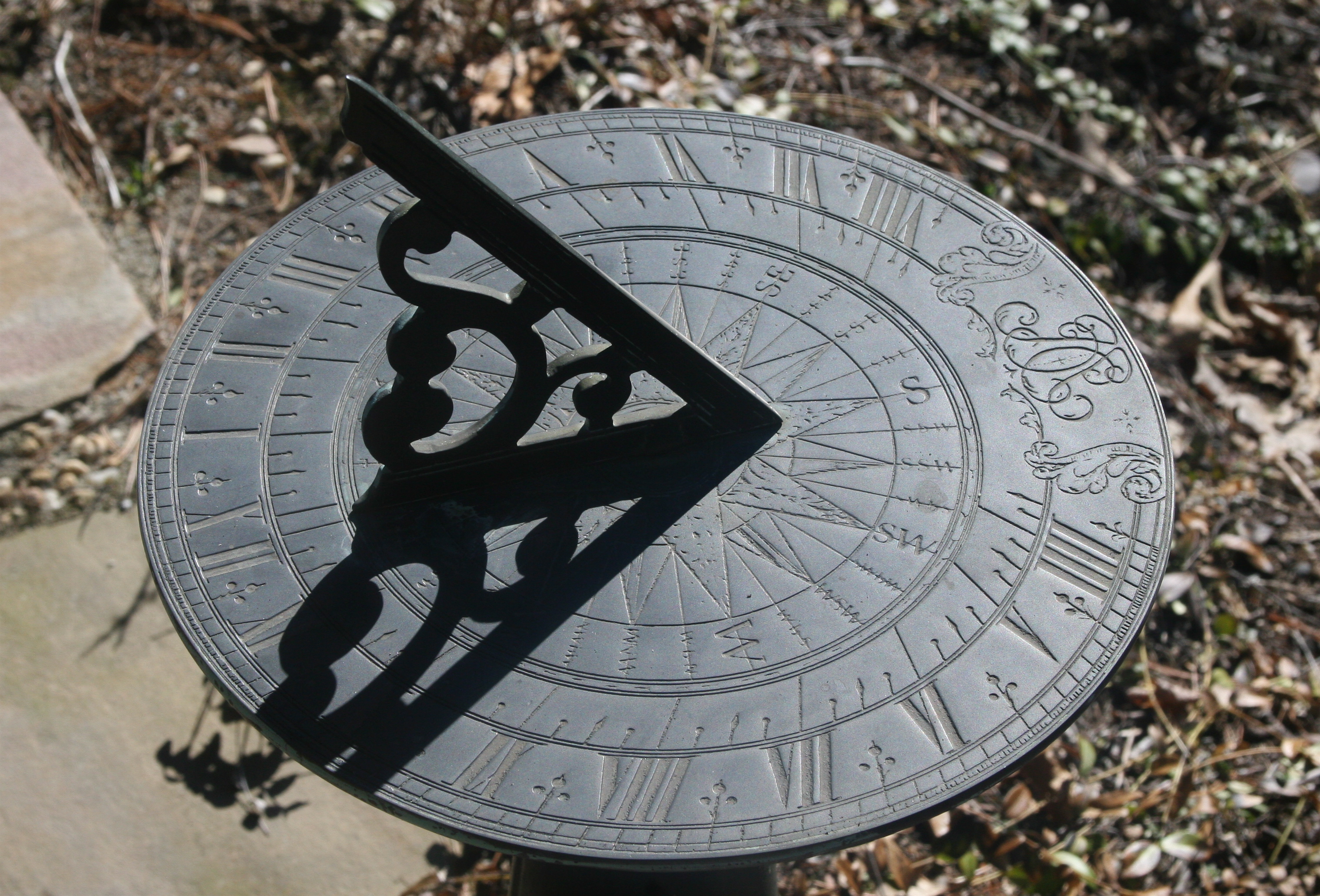Towards the beginning of the life of this blog, I alluded to the fact that Israelites celebrate different holidays than other people. For this year, I plan on writing a series on how I celebrate the fall holidays as a modern, American Israelite, living far away from other Israelites. But, prior to that, some introduction is in order!
Before kicking off the blog series on our Fall Holidays, some explanation of Israelite calenders is necessary. Currently, in the U.S.A., we use the
Gregorian Calender for our year-measuring. This is the calendar with 365 days, leap years every four years, 12 months, etc etc etc. Each week has seven days. The days begin and end at midnight. The system uses daylight savings to change our timed-days to fit the actual daylight-day better. If you're curious about how this system came about, I suggest looking around the internet; I'm wanting to avoid a history lesson today. In short--it came about as a conglomeration of many different calendars in collusion with the Industrial Revolution in the Western World. Now that we have that addressed:
The Israelite calendar is completely different. To start--the year does not have a set number of days. Only after the year is complete will the number of days be countable. There are 12 or 13 months in each year, depending on the year. Unlike the Gregorian Calendar, the leap years are not regular or perfectly predictable. The number of days in a month is also not set. We measure our months based on the moon. Now, most cultures originally based their months on the moon. [English Lesson: Our word "month" comes from "moonth", as did the word for month in many different cultures]. However, as time went on, the months were changed to be more rigid and predictable. Israelite time-measuring is more fluid than rigid--it follows the rhythms of the earth/Universe.

For starters, the Israelite month begins and ends at the new moon. Once the new moon is spotted, the previous month ceases, and the new month begins. In the Israelite community, there is a bit of contention as to what moon actually begins the month. There are two viewpoints on this--one side believes the New Moon (being the dark moon--when no light is seen) is when the month beings. The other side believes when the moon comes back--a phenomenon known as "the Sliver Moon"--the new month begins. There are good arguments for both sides. I'm firmly on the New Moon side (also called the "conjunction").
[If you are interested in learning more about the Sliver vs. Conjunction argument, I highly suggest you check out
119 Ministries--they're pro-Conjunction, but they lay out the evidence for both sides fairly well.]
The Israelite year begins in the spring. Our first month is called Aviv/Abib (also called Nisan), and usually starts sometime in March on the Gregorian calendar. Aviv is the month that opens up the year for a leap-month. The word
Aviv means different things; it is the name of the first month; it means "spring", and it is also the word for a certain ripeness of barley--a spring-time ripeness. Green, full, but not yet fully dried.
The month of Aviv can only begin if the barley is also aviv. If the barley is not yet aviv, spring has not begun, and the year is not over. Instead, another month is added to the year, making 13 months total, and the following month, when the barley is aviv, the new year begins. Philosophically, the year begins when the seasons "begin" again. Winter, all over the world, is associated with death. Spring, conversely, is associated with new life. Our calender fits this philosophy. The old year dies in the winter and is born in spring.
Our days are, similarly, measured differently than the days of the Gregorian calendar. The Gregorian Calendar revolves around unchanging units of time; a second is such and such long, a minute is sixty seconds, sixty minutes in an hour, 24 hours in a day, and so on. Though nifty, this system is not entirely accurate to how the world actually works--it is too rigid--and that is why leap days and daylight savings are utilized to keep the days more or less the same.
The Israelite calendar is fluid; it flows around the changes of the seasons. As before stated, and as you probably are aware, a Gregorian day begins and ends at midnight. Israelite days, however, begin and end at sundown. Once the sun has set, the old day is done, and the new day has begun. Because of this system, daylight savings--jumping ahead or back in time--is not needed. The day follows the sunlight. In the winter, days begin earlier, as the sun sets earlier. In the summer, days end later, as the sun sets later. Our hours, accordingly, are different. They are not always the same length from day to day. Noon is when the sun is the highest, rather than when our clock says so, for example. It can be a little difficult to get used to, but once you get in the groove, it's easy.
 |
| Ya know, like how people used to use these suckers. |
These distinctions are important for a number of reasons, but, they are most important for the keeping of the holidays ("Holy-days", see?). Similarly to how the holidays of Christian America tend to occur on the same day each year (Christmas on the 25th of December, for instance...[but, why not Easter? Hrrrm, I suggest you look into that, dear reader]), Israelite holidays fall on the same day of the
Israelite calendar each year. In order to celebrate properly, one must know the correct day upon which to celebrate.
The trouble comes in when one is an American, working a job based on the Gregorian calendar, but religiously following the Israelite calendar, like I am. For example, "The Feast of Atonement", also known as "Yom Kippur", is one of the more rigid holidays. On this day, you must not drink any water or eat any food. You must do no manner of work at all. Anyone who violates this day will be "cut off" from Israel (
link). In short, it is not a holiday to play around with. Last year, Atonement fell on a Gregorian weekend. It was very easy celebrate the holiday. This year, Atonement falls on a weekday, beginning on the sunset of October 2nd. Therefore, I will have to be absent from work on October 3rd. You can see where the problems arise.
The holidays fall mostly into two clusters--the spring Feasts of Passover, Unleavened Bread, and First Fruits in the spring, Pentecost in the summer, and Trumpets, Atonement, and Tabernacles in the fall. Both the spring and the fall have 8-day celebrations (Unleavened Bread and Tabernacles, respectively). At the beginning and end of each of these 8-day celebrations are additional Sabbaths--days upon which no work must be done. Keeping track of the calendar is very important to avoid violating these Sabbaths.
Upcoming, starting next week, are my favorite holidays--the fall feasts. I plan on writing a more in-depth post on each of the holidays as they come as well as how I celebrate them. However, an Overview is in order!
Feast of Trumpets/Yom Teruah
Kicking off the fall feasts is the loudest holiday of the Israelite year. We celebrate by blowing horns. All day. The horns typically blown by your average Israelite are called "shofars". They are made of a ram's horn. We don't currently own a shofar--we have one ordered and are hoping for it to arrive in time! If not, you'll see how we work around this on the day of. This year's Feast of Trumpets will begin this Tuesday night, the 23rd, at sundown, and continue until the sundown of the 24th.
Day of Atonement/Yom Kippur
Atonement, the solemnest day of the year, involves abstaining from food and water from sundown to sundown and meditating over/atoning for your sins. I'll be writing about how to make Atonement bearable once it rolls around. This year, it will begin on the sundown of October 2nd and end on October 3rd.
Feast of Tabernacles/Sukkot
This is my, and many Israelites', favorite holiday. For the week of this feast, (October 7-15 this year), we all must "dwell" in tabernacles, or, tents! Because this is a longer holiday, Israelites often travel to meet in large groups for some or all of this feast. It is a celebration of the harvest, and there is feasting every night, branch-waving, dancing, and general celebration. Whereas Atonement is a solemn holiday, Sukkot is celebratory and happy.
Thanks for reading, and stay posted for the Fall Holiday posts!
Feast of Trumpets
Atonement
Feast of Tabernacles
Any questions? Leave a comment below!






